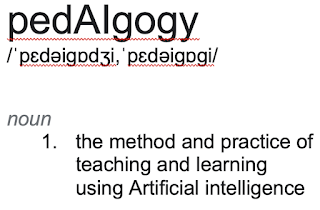
PedAIgogy – new era of knowledge and learning where AI changes everything
Author: Donald Clark
Source
I’m not sure we have fully grasped what has just happened with ChatGPT, or more generally, generative AI. It is a far more profound shift than we realise as it changes our very relationship with knowledge and learning.
Big bang
Knowledge and learning was, for most of our history, largely a matter of oral stories, cave paintings and simple 3D artefacts. Writing, around 5000 years ago, was the big bang of knowledge production but our relationship to that knowledge was slight, as most of us remained illiterate and the elites kept it to themselves. Latin being just one example, the language of deliberate exclusion. The technology; papyrus, paper and vellum remained expensive, copying and reproduction laborious. Then printing amplified the big bang and took it to the masses in their vernacular languages and through books
.
Multimedia
The second big bang was the internet, where digital knowledge eventually became multimodal, largely through multimedia. Text was available through Wikipedia, newspapers, articles and books online. Audio through podcasts and music. Video through YouTube. Also 3D worlds through Google Earth and Maps.
Search
What made the real pedagogic difference, however, was not content but access to content, through ‘search’. Google, Google Scholar and search for YouTube videos (different form of search) was the pedagogic means to the end. Hyperlinks also allowed us to leap across and down into knowledge. Search continues to be developed through semantic search, which promises to be far more accurate.
Social
The relationship with knowledge was also mediated by our relationships with others online. Suddenly we had ties to more than our close friends, relations and work colleagues. We could communicate and share knowledge with anyone online. People began to post, repost, comment, message, Zoom and see knowledge as accessible via others. This vastly expanded our reach into knowledge and learning.
Generative
An entirely different form of dialogue appeared to consumers in 2022 with ChatGPT, famously beating all records for adoption. A fiendishly simple interface, like search (but not really) as it draws on something approaching the sum of human stored knowledge. It is also like social in being trained by us all and involves more dialogue like ‘social’. It is also multimedia, as it can generate text, images, audio and video.
We are no longer in a world with just teachers and learners. We are now in a world of human teachers, human learners but also technology that teaches and technology that learns. We can learn using it, and from it. We can also teach using it and it can also teach us. Pedagogically, we used to be in a diad, we’re now in a tetrad – that is pedAIgogy.
PedAIgogy
This is another big bang, the difference being the dynamic creation of knowledge, in real time, in co-created dialogue. We are no longer using technology to simply find knowledge and learn. We have moved forward to find, create, change, organize, synthesize, even evaluate knowledge and learning with technology. This is a new form of pedagogy, I call ‘pedAIgogy’. We are co-creators, not just of text but in all media, multimedia creators, as well as learning and teaching in a far more complex relationship with technology
We have only just begun to realise that we will now move forward, not by keeping everything at a distance but by embracing dialogue. Socrates and Plato were suspicious of writing for good reasons. In the Phaedrus Plato cautions us about being too reliant on a technology as simple as writing. It may have the opposite educational effect from that intended, as it creates a sense that something is learnt but actually results in forgetfulness. He warns us that writing may be the enemy of memory, as one is not generating from one’s own mind but the already written text.
In returning to a core Socratic relationship with knowledge, new forms of co-created literature, images, audio and video will emerge, new knowledge, new research, new art, new forms of teaching, new forms of learning. We have crossed a generative Rubicon and there is no going back. Neither should we want to, as this technology captures all of our thoughts, It is us. It reflects the many not the few, the hive mind, the supermind.
There are dangers but let’s not imagine that scarcity in knowledge or learning was a great thing. Perhaps we have been drowning in a sea of text in education, learning, research and work for too long.
This may seem heretical but have we have been under the yoke of text heavy institutions for too long, with scarce, expensive courses, plunging many into debt, in some cases for a lifetime? 20 solid years of reading and writing text – that, oddly, is our model. Yet, those most in need of education still seem furthest from it and despite serious, practical, skills’ shortages, vocational learning has been decimated.
Most people want a ‘working knowledge’ of things they want to do, not over-engineered, PPT-led, abstract courses. This new era of PedAIgogy may herald a more dynamic way of formal teaching and learning. It may also swing us quickly toward performance support in the workplace, where the technology responds to needs. A demand driven, not supply-driven model.
